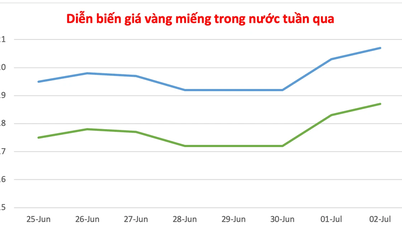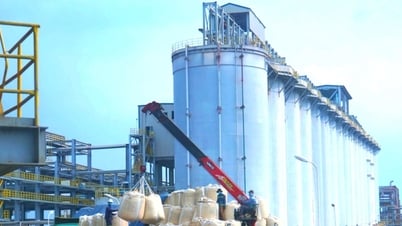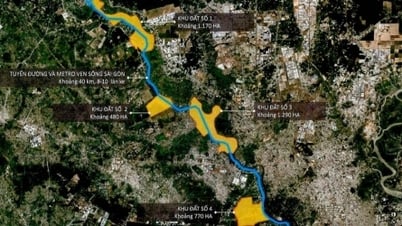Oil prices fell slightly in the first trading session of the week as investors assessed that geopolitical risks in the Middle East had cooled down. Domestically, gasoline prices were adjusted down and oil prices increased from 0:00 on July 1 after the policy of reducing 2% value added tax according to Resolution No. 204/2025/QH15 of the National Assembly officially took effect.
World oil prices
Oil prices fell slightly in the first trading session of the week as investors assessed that geopolitical risks in the Middle East were cooling and the possibility that OPEC+ would consider increasing production from August. However, oil prices still recorded a second consecutive month of increase.
At the end of the first trading session of the week (June 30), according to Oilprice, Brent oil price decreased by 0.16 USD/barrel, equivalent to 0.24%, to 67.61 USD/barrel; WTI oil price decreased by 0.55 USD/barrel, equivalent to 0.84%, to 64.97 USD/barrel.

Previously, during the 12-day war that began on June 13, when Israel attacked Iran's nuclear facilities, Brent oil prices soared above $80/barrel, then plummeted to $67/barrel after US President Donald Trump announced a ceasefire.
“The rapid implementation of the ceasefire suggests that the risk of supply disruption is gradually being eliminated, leading to a decline in risk premiums,” said John Kilduff, a partner at Again Capital in New York.
Meanwhile, according to data from the US Energy Information Administration (EIA), the country's crude oil production in April reached a record 13.47 million barrels per day, up slightly from 13.45 million barrels per day in March. Expert John Kilduff assessed that this record production continued to put pressure on market sentiment.
Reuters reported that four OPEC+ delegates said the group would increase production by 411,000 barrels per day in August, continuing the increase in May, June and July. If the plan is approved, the total increase in production in 2025 will reach 1.78 million barrels per day - equivalent to more than 1.5% of global demand.
“This potential supply pressure is not yet fully reflected in prices, leaving the oil market more vulnerable,” said Saxo Bank head of commodity strategy Ole Hansen.
OPEC+ is expected to meet again on July 6 to discuss future production plans.
Despite the increase in production, the market remains under stress. A Reuters survey showed that OPEC oil production rose in May but was limited by the fact that countries that had previously exceeded their quotas were forced to cut back. Meanwhile, Saudi Arabia and the UAE increased production at levels below their limits.
Kazakhstan, which regularly exceeds its OPEC+ quota, could produce around 2% more than forecast this year after boosting output at its Caspian oilfields, according to data from state-owned KazMunayGaz.
A recent Reuters poll of 40 economists and market analysts in June showed that Brent crude oil prices are forecast to average $67.86 a barrel in 2025, up from the $66.98 forecast in May. Meanwhile, WTI crude oil prices are forecast to average $64.51 a barrel, up slightly from the previous $63.35.
Domestic gasoline prices
From 0:00 on July 1, the Ministry of Industry and Trade - Ministry of Finance will adjust retail gasoline prices when the policy of reducing 2% value added tax (VAT) according to Resolution No. 204/2025/QH15 of the National Assembly officially takes effect.
Specifically, domestic retail prices of gasoline are applied as follows:
| E5RON92 gasoline: No higher than VND 20,530/liter. RON95-III gasoline: No higher than VND 21,116/liter. Diesel 0.05S: Not higher than 19,349 VND/liter. Kerosene: Not higher than 19,064 VND/liter Mazut oil 180CST 3.5S: Not higher than 16,955 VND/kg. |
The above domestic retail prices of gasoline and oil were adjusted by the Ministry of Industry and Trade - Ministry of Finance from 0:00 on July 1 when the policy of reducing 2% value added tax according to Resolution No. 204 of the National Assembly officially took effect. In this adjustment, the price of E5RON92 gasoline decreased by 101 VND/liter, RON95-III gasoline decreased by 128 VND/liter. Meanwhile, the price of diesel oil increased by 193 VND/liter; kerosene increased by 141 VND/liter; and mazut oil alone decreased by 668 VND/kg compared to the previous period.

Previously, on June 17, 2025, the National Assembly issued Resolution No. 204/2025/QH15 on reducing value added tax (VAT). This Resolution stipulates a 2% reduction in value added tax rate, applicable to the group of goods and services specified in Clause 3, Article 9 of the Law on Value Added Tax No. 48/2024/QH15 (to 8%), except for some groups of goods and services such as: Telecommunications, financial activities, banking, securities, insurance, real estate business, metal products, mining products (except coal), goods and services subject to special consumption tax (except gasoline). The Resolution takes effect from July 1, 2025 to December 31, 2026.
Thus, this week there will be two petrol price adjustments. The first adjustment will take effect from July 1, to apply the VAT reduction according to Resolution No. 204 of the National Assembly, and the next adjustment will take place every Thursday as usual, according to the provisions of the Decree on petrol business management.
Source: https://baolangson.vn/gia-xang-dau-hom-nay-1-7-tiep-tuc-giam-nhe-5051824.html




































































































Comment (0)